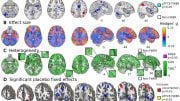
‘Smart’ drugs like methylphenidate, modafinil, and dextroamphetamine might lower performance and productivity in neurotypical individuals, according to new research by the University of Cambridge and the University of Melbourne. The study found these drugs often lead to decreased accuracy and increased time and effort in complex tasks, contrary to the popular belief that they enhance cognitive performance.
Smart drugs do motivate people, but the added effort can lead to “erratic thinking,” adversely affecting above-average performers, according to researchers.
New research from the University of Cambridge and the University of Melbourne, published on June 14 in the journal Science Advances, shows neurotypical workers and students taking cognitive enhancers, or ‘smart’ drugs, may actually be inhibiting their performance and productivity.
Drugs such as methylphenidate, sold under the brand name Ritalin among others, are commonly prescribed for attention deficit hyperactivity disorder (ADHD), but are also taken by those without a diagnosis, in the belief that the drugs will enhance focus and cognitive performance.
“Our results suggest that these drugs don’t actually make you ‘smarter’.” — Peter Bossaerts
In four double-blinded, randomized trials in Melbourne, each a week apart, the same 40 healthy participants took one of three popular ‘smart’ drugs (methylphenidate, modafinil, or dextroamphetamine) or a placebo. They were assessed on how they performed in a test designed to model the complex decision-making and problem-solving present in our everyday lives.
While previous studies into the effects of smart drugs have used simpler cognitive tasks targeting memory or attention, the Melbourne trial involved more computationally complex activities that better simulate the difficult nature of tasks people encounter in daily life.
Participants were asked to complete an exercise known as the Knapsack Optimisation Problem – or ‘knapsack task’ – in which they were given a virtual knapsack with a set capacity, and a selection of items of different weights and values. The participants had to figure out how to best allocate items to the bag, to maximize the overall value of its contents.
Brand names of methylphenidate include Adhansia, Concerta, Daytrana, Metadate, Methylin, Quillivant, and Ritalin.
Modafinil is sold under the brand name Provigil.
Common brands of dextroamphetamine are Dexedrine, Dexampex, DextroStat, Ferndex, ProCentra, and Zenzedi.
Overall, participants taking the drugs saw small decreases in accuracy and efficiency, along with large increases in time and effort, relative to their results when not taking the drugs.
For example, when given methylphenidate – often used to treat ADHD in children, but increasingly taken by college students cramming for exams – participants took around 50% longer on average to complete the knapsack problem as when they were given a placebo.
In addition, participants who performed at a higher level in the placebo condition compared to the rest of the group tended to show a bigger decrease in performance and productivity after receiving a drug.
In terms of “productivity,” for example – the level of progress per item moved in or out of the knapsack – the participants in the top 25% under a placebo regularly ended up in the bottom 25% under methylphenidate.
By contrast, participants who had a lower performance in a placebo condition only very occasionally exhibited a slight improvement after taking a drug.
Professor Peter Bossaerts, Leverhulme International Professor of Neuroeonomics at the University of Cambridge, believes more research needs to be conducted to find out what effects the drugs are having on users without ADHD.
“Our results suggest that these drugs don’t actually make you ‘smarter’,” said Bossaerts. “Because of the dopamine the drugs induce, we expected to see increased motivation, and they do motivate one to try harder. However, we discovered that this exertion caused more erratic thinking — in ways that we could make precise because the knapsack task had been widely studied in computer science.
“Performance did not generally increase, so questions remain about how the drugs are affecting people’s minds and their decision making.”
Dr. Elizabeth Bowman researcher at the Centre for Brain, Mind and Markets at the University of Melbourne and lead author of the study said the results show we have yet to establish the effectiveness of pharmaceutical enhancers on our performance, when used by neurotypical people to perform everyday complex tasks.
“Our research shows drugs that are expected to improve cognitive performance in patients may actually be leading to healthy users working harder while producing a lower quality of work in a longer amount of time,” said Bowman.
Reference: “Not so smart? “Smart” drugs increase the level but decrease the quality of cognitive effort” by Elizabeth Bowman, David Coghill, Carsten Murawski and Peter Bossaerts, 14 June 2023, Science Advances.
DOI: 10.1126/sciadv.add4165









These were never ‘smart’. These are stimulants. Methylfenidate and dextroamfetamine are amfetamines, like methamfetamine. The theory is it speeds up the rest of the brain to catch up with an ADHD mind for a calming harmony, but you still get amfetamine side-effects like erratic thinking. You can watch mehth users become much more productive, but quality suffers. This conclusion is blindingly obvious, but imagine how much money was spent on lobbying and awkward studies hiding this to get the products approved.
Misspellings here are to evade an overzealous word blacklist.
You know nothing about these meds. Amphetamines are NOT METHamphetamine. Similar but not chemically the same at all. My meds do not give me “erratic thinking” at all. They help me focus, period.
Of course amphetamines are not METHamphetamine. However, as I said, the reverse is true. They are in a class of meds based on similar chemical structure to amphetamine, called substituted amphetamines, or just “amphetamines”. The word itself comes from a-Methylphenethylamine. Methamphetamine is stil prescribed as an ADHD treatment, tradename Desoxyn, because it has similar effects on the body.
Just because those are facts doesn’t mean you shouldn’t be taking your prescribed meds. There are trade-offs and risks. I’m sorry, I didn’t mean to hurt your feelings, only to criticize companies that wanted everyone taking these ‘smart’ meds and profit off a recreational market. But still, please be extremely careful with all amphetamines. The study did find “erratic thinking”, yet didn’t test on people with ADHD, and studies funded by manufacturers find an increase in focus in people with ADHD, but I have a hard time believing it won’t have similar side-effects.